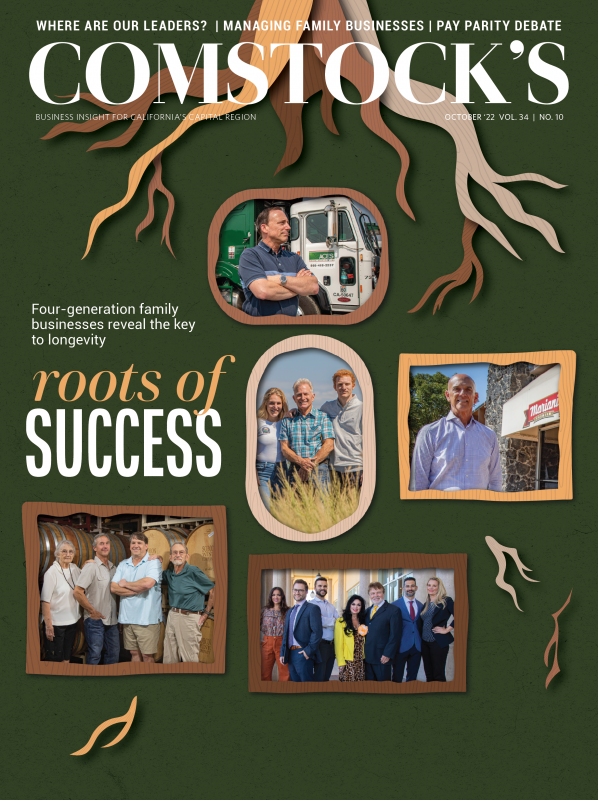How does pay transparency work in a family business setting, and is it always necessary? New legislation may change how businesses, big and small, draft job postings and how they report pay data to the state — and their employees.
SB 1162, which will be either vetoed or signed into law by Gov. Gavin Newsom by the end of September, aims to reduce California’s gender and racial pay gap by expanding pay data reporting requirements for businesses with more than 100 employees and requiring businesses with 15 or more employees to include the pay scale in any job posting. Additionally, pay scale disclosures must be provided, upon request, to employees for the position in which they are currently employed.
Required data to be submitted annually by qualifying businesses to the California Department of Fair Employment and Housing would include median and mean hourly rate for each combination of race, ethnicity and sex within each job category, which can be used to develop and publish annual aggregate reports “provided that the aggregate reports are reasonably calculated to prevent the association of any data with any individual business or person.” This includes individuals hired through labor contractors.
The bill (which was on the governor’s desk at press time) also requires businesses to maintain records of job title and wage rate history for each employee, and failure to do so would create “a rebuttable presumption in favor of an employee’s claim” if a relevant complaint is filed.
State Assemblywoman Cristina Garcia, who co-authored this pay transparency bill alongside its author, state Senator Monique Limón, emphasizes the new law would not dictate how much businesses choose to pay their employees. It would still be up to employees to negotiate their wages based on the provided pay scale.
“I come from a small business household. My parents have owned and operated small businesses all my life, and I am definitely conscious of the burdens and want to make sure we have something that allows individuals to pursue their American dream while we’re protecting employers,” Garcia said. “But as a woman — as a woman of color — who has come up against pay discrimination, we can’t fix something we don’t know. I can’t go in and negotiate if I don’t know what the scale is like. (SB 1162) just gives me one more tool to go in and negotiate for a higher salary.”
So what do family businesses in the Capital Region think about SB 1162?
It’s complicated
Adam and Angela Anderson, husband and wife team at WealthGuard Advisors in Placerville, have different perspectives. Adam, a registered investment advisor, is the owner and founder of the financial planning and asset management firm, and Angela wears many hats, acting as secretary, human resources manager, accountant and bookkeeper.
“At small businesses, you don’t always have a specific title for everyone that you hired, and they’re doing more than one thing,” Angela said, which would make implementation of SB 1162 difficult.
For Adam, who doesn’t deal with HR as much as his wife, the new pay transparency bill is “not the end of the world.” He continued, “In some ways, these things help to tighten up your procedures and operate a cleaner, clearer business model,” particularly when it comes to small businesses running “shoddy” operations, some of which he’s observed in his line of work.
But he does worry that small businesses are overregulated in California. WealthGuard, a company with five employees, is already required to report to five different regulatory agencies.
“And that’s not even getting into the IRS or the state income tax board,” Adam said. “The administration of this business is cumbersome and confusing, and it takes time and effort to sort out how things are supposed to be done.”
Based on prior experience, Angela has concerns about small businesses not being able to absorb lawsuits that could result from increased regulation. Her company has dealt with fraudulent unemployment and workers’ compensation claims that were costly, despite being insured.
“Any time you put the law into this, it opens up the possibility of lawsuits. There are disgruntled employees everywhere who feel like they didn’t get a fair shake, and it’s very difficult to document why you didn’t give as much of a raise or why you feel this person isn’t going to work out anymore,” she said.
Large businesses might be able to weather a hit with the help of a legal team, but small businesses oftentimes don’t have the resources to defend themselves. In addition, Angela believes businesses will find loopholes by reclassifying employees to alter their pay.
“I’m not sure a bill like this is going to make a difference,” she said.
Adding family dynamics into the mix makes the situation “absolutely more complicated,” according to Angela, who only employs one non-family member at the moment and has had to fire her own children in the past.
“It’s difficult if the family members were in the same position because it’s very easy for them to talk to each other and then come back and say, ‘Well, why is he (paid) this?’ And then you have to go into ‘Well, because he works harder than you.’ Which is a very hard conversation to have with a family member,” she said.
Conversely, a parent may choose to increase a child’s salary instead of paying for their rent, or a family employee may see a job posting for their same position at a higher pay scale.
This is happening on a landscape that is already difficult for small businesses to navigate, as qualified workers are harder than ever to find, according to Adam.
“I don’t know if it’s because we’ve given them so much stimulus money or they just aren’t as motivated to work,” he said.
While new legislation may be helpful in some scenarios, Angela fears that new legislation will further complicate her job — which will make her think twice before hiring a 15th employee if her business grows. She believes that small family businesses do best when they are free to compensate their employees how they choose, within the law, as determining what is fair is more complicated than posting a pay scale.
“In my experience, I’ve never felt like I didn’t get paid what I was worth, but then again I’ve been a member of my own business for 20-plus years,” she says. “The majority of our employees are women here, and pay is based on your experience … your merit to the company, how much work you’re putting in.”
Paul Molinelli Jr., a third-generation waste management business owner, employs 61 people at ACES Waste Services Inc. in Amador County, including three of his sons. He and his business partners have an approach to fair compensation that has worked for them over the decades.
“I don’t get any more than my other partners; and as far as employees who are drivers and employees who work at our transfer stations, we all have wages all set. My son who works in the office gets what everyone else who works in the office gets,” Molinelli said. “There are some employees that might get longevity bonuses. But I probably would say I would prefer not to have that listed in an ad.”
Molinelli doesn’t have a problem with sharing pay scales for positions, so long as associated employee names are not made public.
“It would be preferential to not have people’s pay listed in a public domain unless it is a government entity that is required to do that,” he said. “I just think it has a potential to cause hurt feelings and bad blood between people that’s totally unnecessary. If somebody who works here wants to tell another one what they get paid, which we encourage them not to do, I guess they can, but that’s on them.”
Natural selection
Brothers Juan and Toby Barajas opened Savory Cafe in Woodland seven years ago with the experience they gained working at their previous family-owned restaurant. The pandemic was hard on the cafe, forcing them to lay off most of their staff and Toby to leave and pursue another venture.
But today Juan is optimistic. He’s hired back his staff and learned lessons from those difficult years about the importance of providing a livable wage and work-life balance for his employees. Amid what has been called “The Great Resignation,” Juan believes small businesses can attract and retain employees by better valuing their time, and those that don’t do this will inevitably fail in the current job market, regardless of new legislation.
Juan began to test this model when he gave his employees raises upon hiring them back and resolved to always pay them higher than minimum wage. He also reduced business hours at the cafe to allow his workers more time with their families.
“The restaurant industry is demanding,” Juan said. “We wanted to change the industry from what we’d seen before, and we had the opportunity to do that during the shutdown, making sure that everybody is taken care of. … We’re going to pay good wages, and we’re going to work hard. And so far it’s just been a blessing. … Instead of having the Great Resignation, we’ve been able to keep the staff we have and have capable, hardworking individuals by paying better wages.”
Hovering at around 14 employees, Savory Cafe is on the precipice of being more affected by the pay transparency bill if enacted. Juan is not against regulating small businesses, but he recognizes the stress more paperwork can cause an already stretched staff, and he thinks business owners are particularly leery of increased regulation after the roller coaster ride of the pandemic.
“Change is difficult. But it all depends on what the legislation is,” he said. “As long as small businesses don’t have any penalties. Because a lot of times as a business grows, we don’t necessarily have staffing to hire a CFO, a treasurer or anyone who can do some of the financials. As small family businesses, we are trying to absorb a little bit more of what we can do. … It depends on the impact to the business, but (SB 1162) would not hinder my ability to hire someone nor my decision to hire that 15th employee.”
–
Stay up to date on business in the Capital Region: Subscribe to the Comstock’s newsletter today.
Recommended For You

The Essential Work of Women
Women in the workforce juggled careers, families and health concerns amid the pandemic — and found silver linings
As many women faced changes in their jobs during the past two
years of the pandemic, they were able to shift the priorities and
persist with the support of their families, colleagues and
communities.

Buzzwords: Parity
The complexities of wage parity are beyond equal pay for equal work
We’ll be hearing a whole lot of buzz about wage parity this year — in part because groundbreaking research conducted by New York University, University of Pennsylvania and the University of Haifa in Israel identifies flat-out gender bias as the elephant in the room affecting wage parity. This new study, titled “Occupational Feminization and Pay,” is the single most comprehensive study on wage parity in the U.S. to date.

Dilemma of the Month: My Company Stopped Giving Bonuses, but My Coworker Got One
Did bonuses really go away, or did the company
change the criteria or change the bonuses to be entirely
discretionary?

Dilemma of the Month: Using a Coworker’s Salary as Leverage
The National Labor Relations Act protects your right to discuss working conditions with your coworkers, and that includes salaries.

Mending the Gap
In California, efforts to close the gender wage gap persist, despite the signing of The Equal Pay Act of 1963
Fifty-seven years after the Equal Pay Act was signed into law by President John F. Kennedy, women still earn substantially less than men. Legislation in California is attempting to level the playing field.




